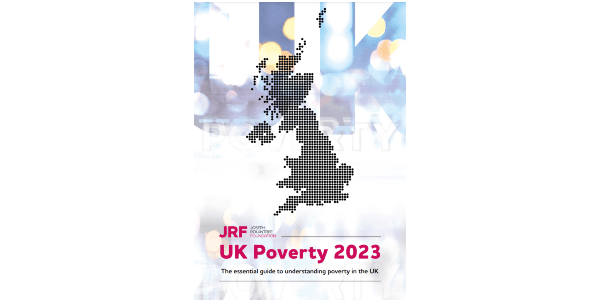
A new report from Joseph Rowntree Foundation (JRF) shows that one in five people were living in poverty in the UK in the first year of the pandemic - and existing Government intervention is still not enough to deal with the current shock to living standards which has driven an increase in poverty and inequalities.
The UK Poverty 2023 report looks at trends in poverty to provide a picture of which groups are worst affected in the UK, and how. Data in this year’s report covers official poverty data between April 2020 and March 2021 while considering more recent data sources and insights. It shows that poverty remained a stubborn problem, with one in five people in poverty in the UK in 2020/21: 7.9 million working age adults, 3.9 million children and 1.7 million pensioners, only slightly down from the 2019/2020 findings.
The poverty line is set below 60 per cent of the UK’s median household income, which in April 2021 was £31,400 per year. Households with incomes lower than £18,840 were therefore defined as living in poverty. JRF state that the reduction in the measured levels of poverty during the period is likely due to falling average income causing the relative poverty line to drop, policy choices (including the £20 a week uplift to Universal Credit) and how the pandemic affected different population groups.
Income is an important building block of health, and it can determine the quality of housing, food, heating and other essentials that help people live longer, healthier lives. The impact of persistent poverty on the UK’s health are clear: more people cannot afford to meet their basic needs.
The report highlights that deep and persistent levels of poverty are stagnant. According to the findings, 69 per cent of people in poverty experienced deep poverty, where their income levels were below 50 percent of the UK median. 42 per cent of people in poverty were in very deep poverty, where income was less than 40 per cent median.
This year’s report also finds continued trends of poverty affecting some groups more than other with significant differences in poverty rates for different ethnic groups due to direct racism and structural racism.
Last year the Runnymede Trust ‘s Falling Faster research found that despite only making up around 15% of the population in the UK, more than a quarter (26%) of those in deep poverty were from Black and Minoritised Ethnic backgrounds, and made up a growing share of those on the lowest incomes.
JRF’s research shines more light on this by revealing that 51 percent from Bangladeshi ethnic groups and 44 per cent from Pakistani ethnic groups were living in poverty. More than two in five people from Black ethnic groups were also in poverty (42%) compared to around 1 out of 5 people from white ethnic groups (19%).
Four in 10 people in the Bangladeshi ethnic group (41%) experienced deep poverty and are most likely to experience very deep poverty. – compared to 8% of white ethnic groups.
The JRF report shows that in-work poverty continued to be a problem, with 61 per cent of households where one or more adult was in work experiencing poverty. Whilst levels fell from a high of 68 per cent before the pandemic, the 202/21 figure still represented a significant rise from 50 per cent in 1996/7. The report highlights that among working-age adults, people living in poverty were more likely to suffer from poor health and have anxiety, as well.
The report covers a period when a temporary £20 a week uplift was applied to Universal Credit. Despite this, the value of benefits remained lower than before 2016. Poverty among families receiving Universal Credit or equivalents remained very high, at 46 per cent.
Housing is an important building block of health and an increasingly important factor in determining poverty. Over eight million social and private renters are in poverty according to JRF and over half of private renters were pulled into poverty by their housing costs The most disadvantaged in the UK are spending more of their income on housing which threatens to cause illness or early death, affect their mental health, and force them to spend more on energy bills to keep warm.
The report provides a sobering picture of the extent of poverty in 2020/21. Since then, inflation and rising energy bills have made it even more difficult for people on low incomes to meet their basic needs and this is having a profound effect on people’s mental and physical health. We know from our funded partners how the Covid-19 pandemic and the cost of living crisis have and still are affecting people in disadvantaged neighbourhoods. Projects funded by People’s Health Trust are influencing local change and supporting people experiencing health inequalities and poverty. However as JRF recommend, as well as increasing benefits to make sure they offer vital support against price rises and a nationwide recession, systematic change is essential to provide a route out of poverty and ill health for the most disadvantaged communities in the UK.
